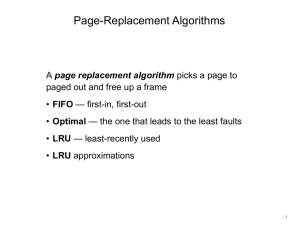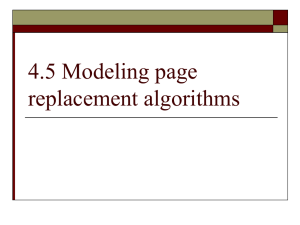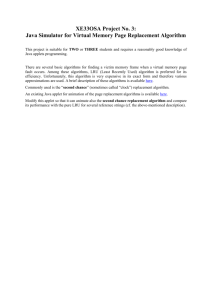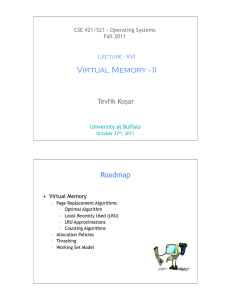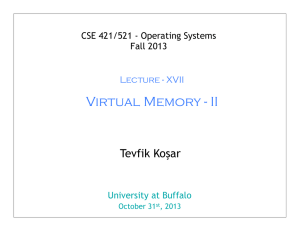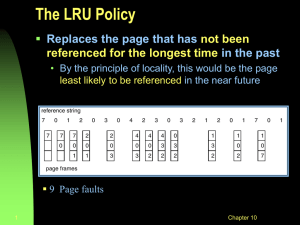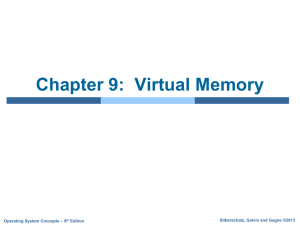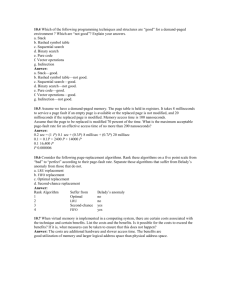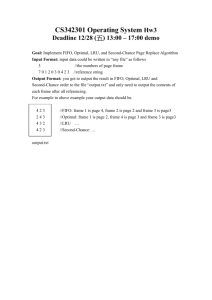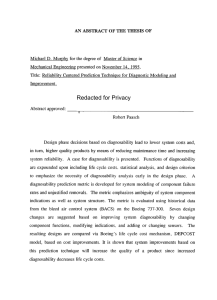Virtual Memory - II Roadmap Tevfik Koşar CSE 421/521 - Operating Systems
advertisement
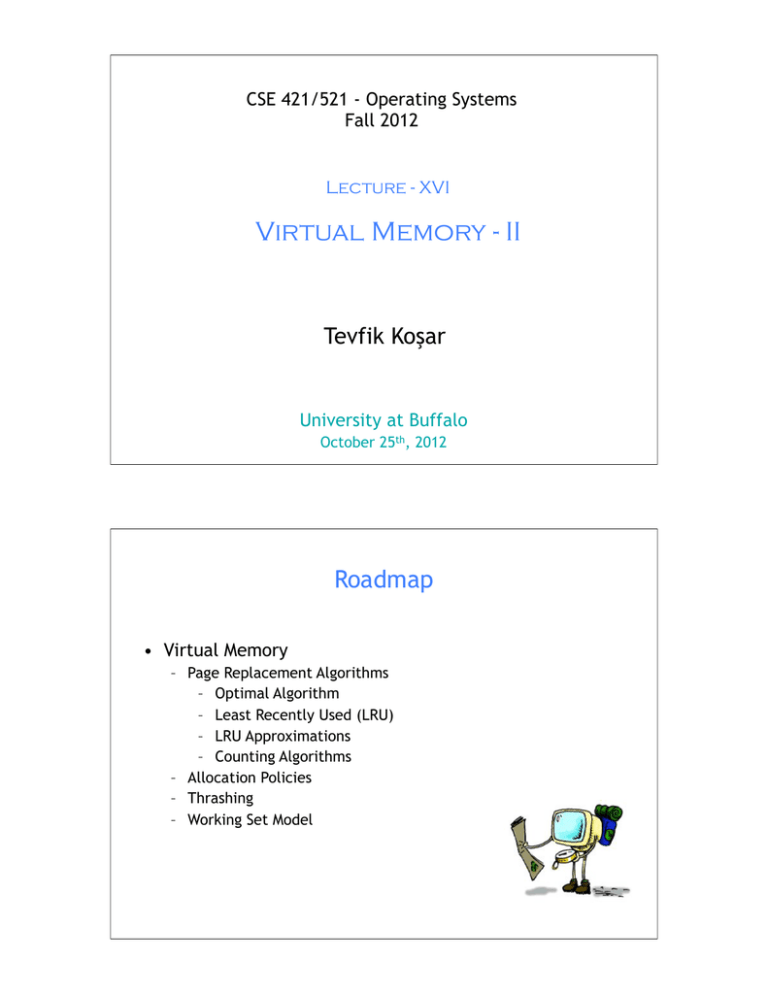
CSE 421/521 - Operating Systems Fall 2012 Lecture - XVI Virtual Memory - II Tevfik Koşar University at Buffalo October 25th, 2012 Roadmap • Virtual Memory – Page Replacement Algorithms – Optimal Algorithm – Least Recently Used (LRU) – LRU Approximations – Counting Algorithms – Allocation Policies – Thrashing – Working Set Model 1 FIFO • FIFO is obvious, and simple to implement – when you page in something, put it on the tail of a list – evict page at the head of the list • Why might this be good? – maybe the one brought in longest ago is not being used • Why might this be bad? – then again, maybe it is being used – have absolutely no information either way • In fact, FIFO’s performance is typically lousy • In addition, FIFO suffers from Belady’s Anomaly – there are reference strings for which the fault rate increases when the process is given more physical memory 3 Optimal Algorithm • Replace page that will not be used for the longest time in future • 4 frames example 1, 2, 3, 4, 1, 2, 5, 1, 2, 3, 4, 5 Optimal Algorithm • Replace page that will not be used for longest period of time • 4 frames example 1, 2, 3, 4, 1, 2, 5, 1, 2, 3, 4, 5 1 4 2 6 page faults 3 4 5 • How would you know this in advance? Optimal (Belady’s) Algorithm • Provably optimal: lowest fault rate (remember SJF?) – evict the page that won’t be used for the longest time in future – problem: impossible to predict the future • Why is Belady’s Optimal algorithm useful? – as a yardstick to compare other algorithms to optimal • if Belady’s isn’t much better than yours, yours is pretty good – how could you do this comparison? • Is there a best practical algorithm? – no; depends on workload • Is there a worst algorithm? – no, but random replacement does pretty badly • there are some other situations where OS’s use near-random algorithms quite effectively! 6 Least Recently Used (LRU) • Reference string: 1, 2, 3, 4, 1, 2, 5, 1, 2, 3, 4, 5 – Least Recently Used (LRU) • Reference string: 1, 2, 3, 4, 1, 2, 5, 1, 2, 3, 4, 5 1 5 2 – 3 5 4 3 4 Least Recently Used (LRU) • LRU uses reference information to make a more informed replacement decision – idea: past experience gives us a guess of future behavior – on replacement, evict the page that hasn’t been used for the longest amount of time • LRU looks at the past, Belady’s wants to look at future • How is LRU different from FIFO? • Implementation – to be perfect, must grab a timestamp on every memory reference, then order or search based on the timestamps … – way too costly in memory bandwidth, algorithm execution time, etc. – so, we need a cheap approximation … LRU Implementations • Stack implementation – keep a stack of page numbers in a double link form: – Page referenced: • move it to the top • requires 6 pointers to be changed – No search for replacement LRU Approximation Algorithms • Reference bit – With each page associate a bit, initially = 0 – When page is referenced bit set to 1 – Replace the one which is 0 (if one exists). We do not know the order, however. • Additional Reference bits – 1 byte for each page: eg. 00110011 – Shift right at each time interval LRU Clock Algorithm • AKA Not Recently Used (NRU) or Second Chance – replace page that is “old enough” – logically, arrange all physical page frames in a big circle (clock) • just a circular linked list – a “clock hand” is used to select a good LRU candidate • sweep through the pages in circular order like a clock • if ref bit is off, it hasn’t been used recently, we have a victim – so, what is minimum “age” if ref bit is off? • if the ref bit is on, turn it off and go to next page – arm moves quickly when pages are needed – low overhead if have plenty of memory – if memory is large, “accuracy” of information degrades • add more hands to fix Second-Chance (clock) Page-Replacement Algorithm Counting Algorithms • Keep a counter of the number of references that have been made to each page • LFU Algorithm: replaces page with smallest count • MFU Algorithm: based on the argument that the page with the smallest count was probably just brought in and has yet to be used Allocation of Frames • Each process needs minimum number of pages • Two major allocation schemes – fixed allocation – priority allocation Fixed Allocation • Equal allocation – For example, if there are 100 frames and 5 processes, give each process 20 frames. • Proportional allocation – Allocate according to the size of process Priority Allocation • Use a proportional allocation scheme using priorities rather than size • If process Pi generates a page fault, – select for replacement one of its frames – select for replacement a frame from a process with lower priority number Global vs. Local Allocation • Global replacement – process selects a replacement frame from the set of all frames; one process can take a frame from another • Local replacement – each process selects from only its own set of allocated frames Thrashing • If a process does not have “enough” frames, the page-fault rate is very high. This leads to: – Replacement of active pages which will be needed soon again ! Thrashing ≡ a process is busy swapping pages in and out • Which will in turn cause: – low CPU utilization – operating system thinks that it needs to increase the degree of multiprogramming – another process added to the system Thrashing (Cont.) Locality in a Memory-Reference Pattern Working-Set Model • Δ ≡ working-set window ≡ a fixed number of page references Example: 10,000 instruction • WSSi (working set of Process Pi) = total number of pages referenced in the most recent Δ (varies in time) – if Δ too small will not encompass entire locality – if Δ too large will encompass several localities – if Δ = ∞ ⇒ will encompass entire program • D = Σ WSSi ≡ total demand frames • if D > m ⇒ Thrashing • Policy if D > m, then suspend one of the processes Working-set model Exercise • Consider the following page-reference string: 1, 2, 3, 4, 4, 3, 2, 1, 5, 6, 2, 1, 2, 3, 7, 8, 3, 2, 1, 5 Assuming 4 memory frames and LFU, LRU, or Optimal page replacement algorithms, how many page faults, page hits, and page replacements would occur? Show your page assignments to frames. 24 Summary • Virtual Memory – Page Replacement Algorithms – Optimal Algorithm – Least Recently Used (LRU) – LRU Approximations – Counting Algorithms – Allocation Policies – Thrashing – Working Set Model Hmm. . • Next Lecture: Project 2 Discussion • Reading Assignment: Chapter 9 from Silberschatz. Acknowledgements • “Operating Systems Concepts” book and supplementary material by A. Silberschatz, P. Galvin and G. Gagne • “Operating Systems: Internals and Design Principles” book and supplementary material by W. Stallings • “Modern Operating Systems” book and supplementary material by A. Tanenbaum • R. Doursat and M. Yuksel from UNR • Gribble, Lazowska, Levy, and Zahorjan from UW
